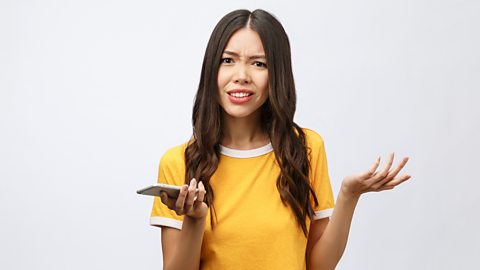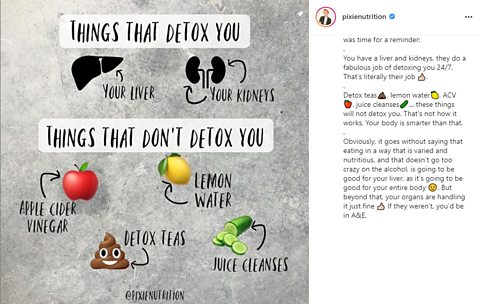5 things you should know before taking diet advice online

Influencer adverts on websites, social media and in apps led to more than a quarter of the complaints made to the Advertising Standards Authority (ASA) about online activity last year. Yet nutritional advice from celebrities not qualified in the field is still common on social media. While many dieticians and nutritionists agree these platforms can be a positive way to communicate health messages, with so much misinformation posted, are there easy ways to distinguish good advice from bad? Here are five tell-tale signs the experts say we should look out for.
1. Is the only evidence a personal story?
“Personal stories draw people in because they are relatable and easier to understand than evidence”, says dietitian Catherine Rabess. If advice implied by these stories isn’t back up by science, be wary, as they “often have no scientific background and can’t be applied to other people”.
Alarm bells might ring if a story encourages the idea that everyone can look the same if they adopt the same lifestyle, or equates appearance with wellbeing and knowledge of health. “You can’t override genetics with food and exercise”, says registered nutritionist Pixie Turner, warning that “appearance is a terrible indicator of whether someone is good at giving advice”.
Experts agree social media can bring people together to share real-life issues and connect, for example over conditions such as coeliac disease or Irritable Bowel Syndrome. But while it can create a positive space for support and learning, Turner warns against comparing yourself to other people. If you are unwell and need nutritional advice, it should be sought from a medical professional.
2. Is the person offering advice selling something?
Sponsored posts are the norm on social media, and we’re used to seeing the #ad for everything from diet pills to dog food. But “when we take money for something, we are biased”, points out dietitian Sophie Medlin. She warns we should beware of people promoting products, such as diet aids, if they “don’t have the knowledge to say if it is safe or not”.
The ASA says, “celebrities or members of the public have to have used any product they are paid to endorse”. However, a BBC investigation suggested some influencers have agreed to advertise diet products on their social media without having used them.
Some influencers have had Instagram posts touting diet products banned by the ASA, who said their claims represented an “irresponsible” message. And one celebrity was admonished because it wasn’t clear an Instagram story she posted was an advert promoting a beauty brand.
The ASA specifies that “claims that are likely to be interpreted as factual and appear in a testimonial must not mislead or be likely to mislead the consumer”.
With so many complaints being made to the ASA, Medlin believes social media users are wising up to sponsored content. She and dietitian Hala El-Shafie are campaigning for more regulation on what can be advertised and who can provide health advice on social media. “Celebrities endorse dangerous diet products, such as appetite suppressants, diet pills, teas, injectable weight loss medication and IV drips that come with huge risks”, she says. Medlin insists there should be “regulations to prevent influencers promoting products that have an impact on health".
Some advertising posts promoting dieting and cosmetic surgery are blocked from under-18s, and people of any age can report posts they consider inappropriate, including those selling unregulated goods, containing false information or related to eating disorders.
3. Does the advice use words with no scientific definition?
You may have heard of ‘detoxing’ and ‘cleansing’, but do you know what they mean? These words are “defined by the individuals who use them”, says Turner. There is no scientific definition for them when used to market a product.
When someone uses the word ‘detox’, “it is a strong indictor they have no understanding of how the human body works”, says Turner, adding “you have a liver and kidney which are very well equipped to do this for you”. Medlin reassures us, “the foods you eat are not toxic, if they were you’d die or be seriously ill”.
‘Superfood’ is another common marketing word with no scientific definition. Harvard University traces the origins of the concept to a sales campaign for bananas in the early 20th century. ‘Superfoods’ are often “quite difficult to find, ‘exotic’ by UK standards or very expensive”, notices Turner. “This adds an air of exclusivity and puts a needless heavy price tag on health.”

4. Does it demonise food without medical reason?
Many people advocate cutting out food groups, but it’s important to replace lost nutrients with other foods if you do this.
Carbohydrates are sometimes demonised, but Rabess warns cutting them out can “lead to chronic fatigue, as they provide glucose, which every single system in your body needs to function”.
If you’re eliminating dairy, be sure to replace it with an alternative calcium source, as Medlin warns there may be health implications even if you are in your 20s, such as osteoporosis later in life.
There are also psychological risks associated with attaching ‘good’ or ‘bad’ labels to foods, warns Turner, as this “allows you to see yourself as a good or bad person”. Thinking this way can lead to “depression, anxiety, body image issues and feeling out of control around food”, she warns. Of course, it’s sensible to limit your consumption of some foods, but the important health message is to follow a healthy balanced diet.
5. Does it promote cure-alls?
The BDA advises we avoid diets that promote a magic ingredient or product to solve any ‘problem’ without having to change our lifestyle.
“If there was a magic cure-all, we’d all be using it”, says Medlin, adding “nothing you take in capsule form can outrun an overall unhealthy diet, stress and not taking enough exercise”. She recommends spending your money in the fruit and vegetable aisle rather than the pharmacy.
Who should we look to for nutrition advice?
“The people with the fewest qualifications often have the loudest voice”, says El-Shafie. Dietitians and registered nutritionists are regulated and held responsible for what they say unlike unqualified influencers. “A degree in nutrition and ensuring the advice comes from someone on a professional register, means the information they give is evidenced based and they will be held accountable for what they recommend”, El-Shafie concludes.


